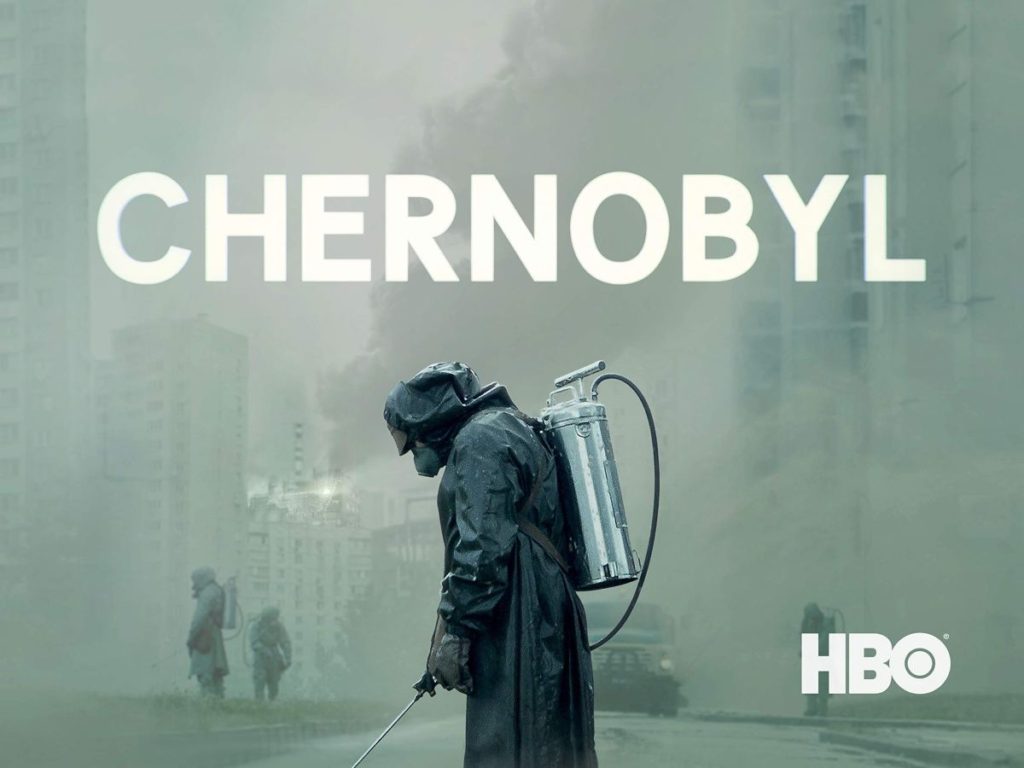Where to watch it: NOW TV, Sky Atlantic
How strongly I recommend it: 8/10
Chernobyl is a dramatic adaptation of the nuclear plant disaster which occurred at the Chernobyl Nuclear Power Plant, near the city of Pripyat in the north of the Ukrainian Soviet Socialist Republic, Soviet Union, on Saturday 26th April 1986.
The five episode HBO miniseries takes a broad view of the disaster, showing us the wide ranging consequences of the event, and how it affected the lives of so many different people, depicting not just the experiences of the plant workers and government officials, but some of the lesser-known stories of the disaster, including the efforts of the firefighters who were the first responders on the scene, volunteers, and teams of miners who dug a tunnel under Reactor 4.
For the series main narrative through-line, we follow Valery Legasov (played by Jared Harris), the deputy director of the Kurchatov Institute and expert on nuclear reactors who is brought in to investigate and devise a clean-up effort for the disaster. He is partnered with Boris Shcherbina (Stellan Skarsgård), a deputy chairman at the Council of Ministers and self-proclaimed Soviet ‘partyman.’ They are joined finally by Ulana Khomyuk (Emily Watson), a nuclear physicist from Minsk, who is also one of the show’s few fictional characters, being a composite of the many scientists who aided Legasov and Shcherbina in their efforts as they desperately scrape together any resources available to them to save as many lives as possible. One of the shows major strengths is its characters. Legasov is depicted as a sympathetic man of vast intelligence, who is surrounded by ignorant government officials who seek to block and hinder his potentially life-saving work at every turn for the sake of their image. Another brilliant piece of character work is the transformation Shcherbina goes through, from representing the disaster deniers just mentioned, to being completely won over by Legasov, as a respect and almost friendship develops between the two men.
I had heard from several people how good the show was, and for the most part, I found it to be a really good watch. One of my favourite things about Chernobyl is actually the universality of its message. While many might think that a show based on such a specific event, taking place at such a specific moment in time and on a continent as unique as Russia, that its scope would be more limited. Its display of administrative incompetence goes so much further than a simple indictment of the Soviet Union. Yes, living under the Iron Curtain must have been terrible, but the behaviour of the higher ups responsible for the disaster, the blind leading the blind and constant blame-gaming of the morons in charge can so easily be applied to world leaders the world over and throughout history. These types of scenes do an excellent job of getting under your skin, and will have you squirming around in your seat as you watch well-meaning, intelligent individuals be bullied by their so-called superiors. It is especially biting and relevant to the world of Western politics today, with the Soviet Union’s concept of Alarmism, which is eerily similar to the current media whirlwind of so-called ‘Fake News.’ Put simply, if you deny a problem, then it doesn’t exist, and anyone who attempts to say other wise is an Alarmist (or spreading fake news.)
While clearly well researched and extremely well written, acted and produced, I’d advise that you watch Chernobyl with a ‘grain of salt’ type attitude; many discrepancies have been pointed out between the series and real events, and while I’ll say the show is a brilliant example of fact-based historical drama, I implore you to please remember the ‘based’ part, as some big chunks of the show are completely made up to add to the drama and thrill the audience. There is nothing inherently wrong with this, I just wish the show had been a bit more up front about which bits were fiction, rather than waiting until the end to tell me.
Chernobyl is a great place to start if you want to know more about this world-changing event, and is for anyone who likes gripping TV dramas and miniseries, or has an interest in recent history. Even if you don’t, it’s still an enthralling watch, but I strongly advise you to use it as a jumping off point to begin your own research from, rather than taking it as the definitive story of what happened. The miniseries is based in large part on the recollections of Pripyat locals, as told by Belarusian Nobel laureate Svetlana Alexievich in her book Voices from Chernobyl, so this might be a good place to go next.
You might also like…
HBO’s Chernobyl & Personal Responsibility by Philosophy Tube – A brilliantly insightful and well researched analysis of how the themes and concepts put forward in the series can be applied to recent and current events. Its also really fun to watch. Watch it here: https://www.youtube.com/watch?v=oENI8NnTx0w
